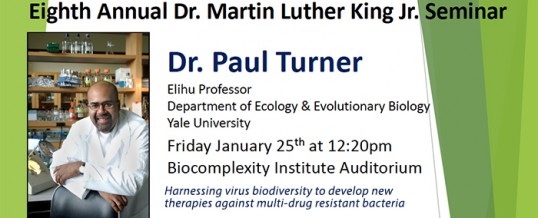Dr. Paul Turner, Yale Biologist, to give MLK Seminar on January 25th
January 1, 2019

Dr. Paul Turner, Professor of Ecology and Evolutionary Biology, Yale University, will give the Eighth Annual Dr. Martin Luther King Jr. Seminar in the Biocomplexity Institute Auditorium on Friday, January 25, 2019 at 12:20 pm. His talk is titled, “Harnessing virus biodiversity to develop new therapies against multi-drug resistant bacteria.”
Dr. Paul Turner received his B.S. from the University of Rochester in Biology, his Ph.D. from Michigan State University, followed by postdoctoral appointments at the NIH, University of Valencia, and University of Maryland. He was recently named the first Elihu Professor of Ecology and Evolutionary Biology in honor of the school’s namesake, Elihu Yale. Dr. Turner is the director of the Graduate Program in Microbiology for Yale University School of Medicine. He has also contributed to diversity initiatives at Yale and in professional organizations.
The main focus of his lab group is to study evolutionary genetics and genomics of microbes, especially the ability of viruses to adapt (or not) to changes in their biotic and abiotic environments. These studies concern environmental challenges faced by viruses at all levels of biological organization, including effects of changes in molecules, proteins, cells, populations, communities and ecosystems. Our work is highly interdisciplinary, employing microbiology, computational biology, genomics, molecular biology and mathematical-modeling approaches, and especially experimental evolution (‘evolution-in-action’) studies under controlled laboratory conditions. We use a wide variety of RNA and DNA viruses in our studies, including various lytic, temperate and filamentous phages that infect bacteria. Also, we examine arthropod-borne viruses, such as vesicular stomatitis virus, Sindbis virus, dengue virus, and chikungunya virus, grown in lab tissue culture or within live mosquitoes. Many of our projects use basic research to test fundamental ideas, such as theoretical predictions of virus disease emergence and of virus evolvability. Other projects are more applied and concern evolutionary medicine. For example, we use evolution-thinking to develop novel virus-based therapies to treat antibiotic-resistant bacteria and to attack cancer cells.
Sponsors:
Hosted by the Biological Sciences Diversity Committee. Co-sponsors: VT Life Sciences Seminar; Department of Biological Sciences; College of Science Diversity Committee; College of Natural Resources and Environment; Women and Minority Artists and Scholars Lecture Series; Global Change Center; Office of Inclusion and Diversity; Ecology, Evolution, and Behavior Seminar; College of Veterinary Medicine.







